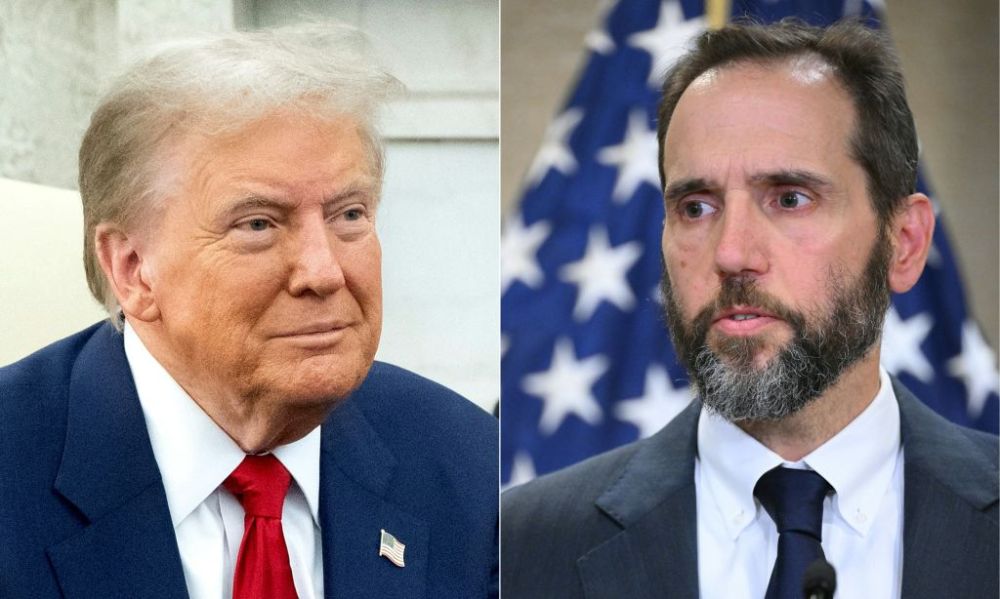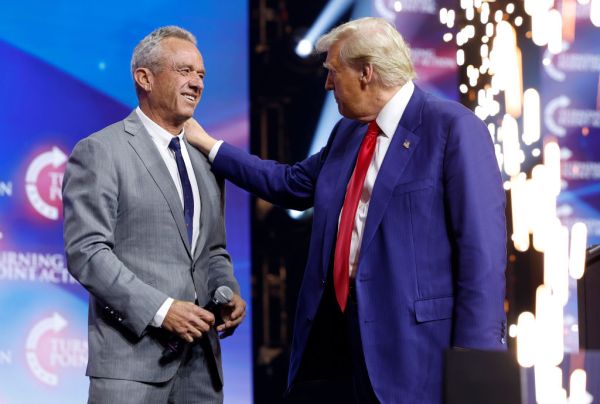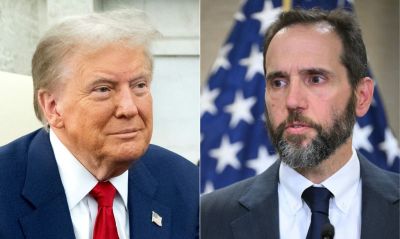Welcome back one final time to The Collision! Things have been quiet around here, and like special counsel Jack Smith, it looks like we’ll be shutting down our look at the collision between presidential politics and the law. (But we still have a bunch of other great newsletters, so don’t miss your chance to take $25 off an annual membership. Use the code BLACKFRIDAY to give yourself the gift of better understanding and subscribe to The Dispatch today. Join now!)
The Docket
- There will be no sentencing of Donald Trump for his New York criminal conviction today —or possibly ever. Trump was found guilty on 34 counts of falsifying business records under New York state law in May. But Trump was never sentenced and now that he won the presidential election, whether the conviction will even stand is unclear. With appeals pending, Judge Juan Merchan last week granted Trump’s request to file a motion to dismiss his criminal case as well as postponing the sentencing hearing that had been scheduled for today. Merchan’s order requires Trump’s legal team to submit its motion by the end of December 2 while prosecutors have a week to respond. What does this mean? That Trump is unlikely to be sentenced before he is inaugurated as president in January. And while he holds the office of the presidency, further proceedings—including appeals and sentencing—will have to wait for four more years because it would interfere with his ability to execute the duties of his office.
- Here, by the way, was Trump spokesman (and incoming White House communications director) Steve Cheung’s response to the news out of Manhattan: “In a decisive win for President Trump, the hoax Manhattan Case is now fully stayed and sentencing is adjourned. President Trump won a landslide victory as the American People have issued a mandate to return him to office and dispose of all remnants of the Witch Hunt cases. All of the sham lawfare attacks against President Trump are now destroyed and we are focused on Making America Great Again.”
- Down in Georgia last week, the state’s court of appeals canceled oral arguments scheduled for December 5 in the question concerning whether Fulton County district attorney Fani Willis should be disqualified from prosecuting her election interference case against Trump and several co-conspirators. While it’s still unclear why the court is no longer holding oral arguments—one of the attorneys for a co-defendant suggested to the Atlanta Journal-Constitution that it could mean the court will decide the question on the merits without a need for any oral arguments—it does represent another lengthy delay. And, again, no matter if Willis is retained or a new prosecutor is selected to continue pursuing the case, a state cannot continue to pursue criminal charges against someone who currently holds the office of the president.
- Although a state almost certainly cannot pursue criminal charges against a sitting president under our Constitution, the Supreme Court has previously held—during the Clinton administration—that civil processes may continue. This will include the New York attorney general’s fraud case, which resulted in a $450 million judgement against Trump and the Trump organization and is currently being appealed. It also includes both the $5 million judgement and the separate $83 million judgment against Trump in which he was found liable for liable for sexual abuse and defamation against E. Jean Carroll. Trump’s nominee for solicitor general, John Sauer, argued on appeal to the 2nd Circuit Court of Appeals in September that the jury was prevented from certain evidence and that other inflammatory testimony was improperly introduced during the trial.
- The annual presidential turkey pardon ceremony was a relatively dour affair, as President Joe Biden went light on the jokes Monday at the White House and struck a more somber tone ahead of his final Thanksgiving as president. From the New York Post: “Retiring President Biden granted a presidential reprieve Monday to poultry named Peach and Blossom at the traditional pre-Thanksgiving turkey pardon — as hard-partying two-time felon Hunter Biden, who has been at the White House since last week, is still waiting to learn if his dad will give him clemency.” Okay, then.
Collision Averted
The federal prosecution of Donald Trump is going out with a whimper.
Special counsel Jack Smith filed a motion Monday to dismiss his office’s case against Trump in Washington, D.C. Smith argued that his election interference case, per the guidance of the Justice Department and the famous 2000 opinion from the department’s Office of Legal Counsel, should be dismissed before Trump’s inauguration on January 20. Simply put, a sitting president cannot be prosecuted by his own Justice Department.
“That prohibition is categorical and does not turn on the gravity of the crimes charged, the strength of the Government’s proof, or the merits of the prosecution, which the Government stands fully behind,” Smith’s filing read.
By that same justification, Smith argued in a separate filing on Monday to dismiss his office’s appeal of the decision by Judge Aileen Cannon to dismiss his classified-documents case against Trump in the Southern District of Florida. (Remember when Cannon did this, way back in the summer, before President Joe Biden dropped out of the 2024 race? It was forever ago.)
Meanwhile, it took just a couple of hours for Judge Tanya Chutkan of the D.C. Circuit Court to respond to Smith’s request. She granted the motion, dismissing without prejudice the superseding indictment on Trump’s election interference in a single-page order. Theoretically, that means the case could be brought again once Trump leaves office in a little more than four years. But effectively? It’s over, done, kaput.
“The American People re-elected President Trump with an overwhelming mandate to Make America Great Again,” said Steven Cheung in a statement after news of Smith’s election-interference motion broke. “Today’s decision by the DOJ ends the unconstitutional federal cases against President Trump, and is a major victory for the rule of law. The American People and President Trump want an immediate end to the political weaponization of our justice system and we look forward to uniting our country.”
But it’s not clear whether the special counsel’s work is entirely done. Under Department of Justice regulations, a special counsel doesn’t get to just close the books and walk off into the sunset.
“At the conclusion of the Special Counsel's work, he or she shall provide the Attorney General with a confidential report explaining the prosecution or declination decisions reached by the Special Counsel,” the regulatory language states. What exactly will Smith’s report to Attorney General Merrick Garland say? Of course, it could be a one-page summary of Smith’s court filings in these cases with the indictments attached in the appendix. Or … not.
In the January 6 case, the indictment itself provided a fulsome description of the evidence that Smith intended to present at trial, but did the DOJ have any yet-to-be-made-public bombshells in the classified documents case? Does Smith have some parting shots for the Supreme Court’s immunity decision that he’d like to share with the class? If Smith provides a more detailed report to Garland, will the AG release it to the public ahead of Trump’s inauguration? Would releasing such a report be more likely to kneecap Trump politically just weeks before he takes office or would it simply make the Department of Justice look bitter and partisan?
And so—like any show that gets unexpectedly canceled before the next season was set to air—we leave you with a few loose ends and a cliffhanger that may never be resolved. More likely than not, this is the last Collision newsletter. But never say never …








Please note that we at The Dispatch hold ourselves, our work, and our commenters to a higher standard than other places on the internet. We welcome comments that foster genuine debate or discussion—including comments critical of us or our work—but responses that include ad hominem attacks on fellow Dispatch members or are intended to stoke fear and anger may be moderated.
With your membership, you only have the ability to comment on The Morning Dispatch articles. Consider upgrading to join the conversation everywhere.